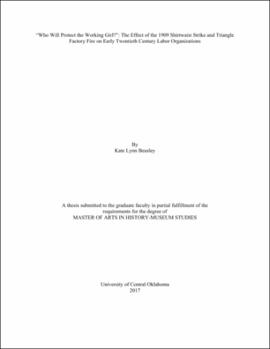| dc.contributor.advisor | Lacher, Katrina | |
| dc.contributor.author | Beasley, Kate Lynn | |
| dc.date.accessioned | 2020-07-09T14:40:03Z | |
| dc.date.available | 2020-07-09T14:40:03Z | |
| dc.date.issued | 2017 | |
| dc.identifier.other | (AlmaMMSId)9982578485002196 | |
| dc.identifier.uri | https://hdl.handle.net/11244/325049 | |
| dc.description.abstract | Organized labor through unions was prominent as part of the Progressive Era in the early twentieth century. Under the influence of the American Federation of Labor, groups such as the Women's Trade Union League and International Ladies' Garment Workers' Union had active roles in New York City's labor movement. Early policy favored mass strikes as a way to earn collective bargaining between workers and their employers. In 1909, a revolution swept the City's garment trade when twenty thousand shirtwaist-making women walked out of their jobs. At the time, it was the largest gathering of women in American history. The WTUL and Local 25 of the ILGWU joined forces in representing strikers and securing a fair agreement between workers and businesses. On March 25, 1911, one hundred and forty-six innocent factory workers died in the Triangle Shirtwaist Factory Fire and the WTUL and ILGWU discovered their policies were not as strong as they had spent almost a decade believing. The following work examines the policies of the Women's Trade Union League, the International Ladies' Garment Workers' Union, and how the 1909 Shirtwaist Strike and Triangle Factory Fire effected these organizations and initiated new labor policies. Examining the impact of both events through newspapers, the words of organizers, and analysis of other historians affirms the WTUL and ILGWU changed their policies, because of the Triangle Fire. | |
| dc.rights | All rights reserved by the author, who has granted UCO Chambers Library the non-exclusive right to share this material in its online repositories. Contact UCO Chambers Library's Digital Initiatives Working Group at diwg@uco.edu for the permission policy on the use, reproduction or distribution of this material. | |
| dc.subject.lcsh | Labor policy | |
| dc.subject.lcsh | Women labor union members | |
| dc.subject.lcsh | Women employees | |
| dc.subject.lcsh | Labor unions | |
| dc.subject.lcsh | Labor movement | |
| dc.subject.lcsh | Shirtwaist Makers' Strike, New York, NY, 1909 | |
| dc.title | "Who will protect the working girl?" : the effect of the 1909 shirtwaist strike and triangle factory fire on early twentieth century labor organizations. | |
| dc.type | Academic theses | |
| dc.contributor.committeeMember | Springer, Michael S. | |
| dc.contributor.committeeMember | Goulding, Marc | |
| dc.thesis.degree | M.A., History - Museum Studies | |
| dc.identifier.oclc | (OCoLC)on1034990652 | |
| uco.group | UCO - Graduate Works and Theses::UCO - Theses | |
| thesis.degree.grantor | Jackson College of Graduate Studies. | |
